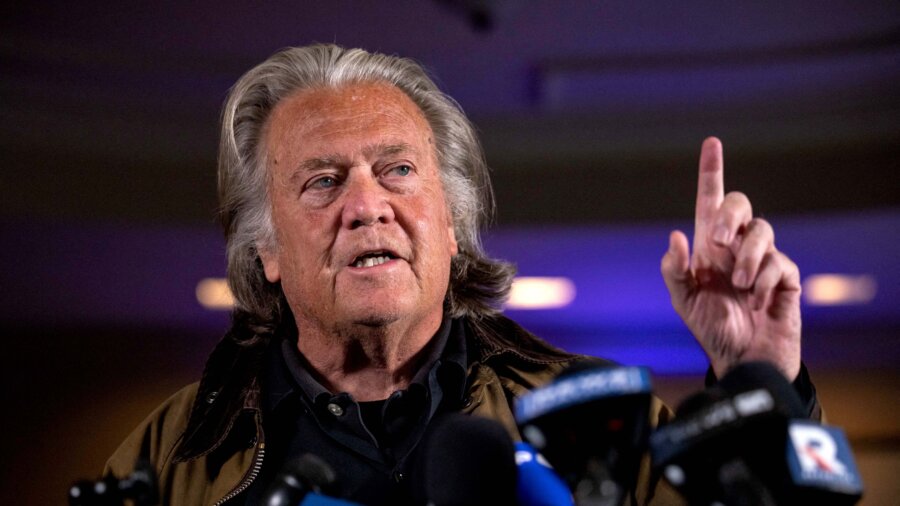Steve Bannon, who served as a top White House adviser early on in the Trump administration, was released from prison on Oct. 29 after serving four months for contempt of Congress.
“The four months in federal prison not only didn’t break me, it empowered me,” he said during his “WarRoom” podcast. “I am more energized and more focused than I’ve ever been in my entire life.”
Bannon, 70, was serving time in the Federal Correctional Institution in Danbury, Connecticut. His release comes after a federal judge on Oct. 22 denied his request for early release. Bannon entered prison in July after the Supreme Court refused to take up his request to avoid his four-month sentence.
When he began serving his sentence in July, Bannon called himself a “political prisoner.”
“I am proud of going to prison,” he said at the time, adding that he was standing up to Attorney General Merrick Garland and what he called a “corrupt” Justice Department.
A jury convicted him in 2022 for two counts of contempt of Congress after he refused to comply with requests from the House select committee investigating the Jan. 6, 2021, Capitol breach.
Bannon, 70, claimed that former President Donald Trump had extended executive privilege over his testimony. Bannon’s attorney, David Schoen, told the U.S. Court of Appeals for the District of Columbia Circuit that the district court had wrongly excluded evidence surrounding another attorney advising Bannon that he didn’t have to comply with the subpoenas because Trump had invoked that privilege.
“At a bare minimum, it’s required that the defendant know or understand that his or her conduct was unlawful or wrong,” Schoen told the court in November 2023.
“Mr. Bannon acted in the only way he believed and understood from his lawyer that the law permitted him … to behave in response to the subpoena.”
The appeals court said that under its precedent, Bannon’s advice-of-attorney defense “is no defense at all.”
“As both this court and the Supreme Court have repeatedly explained, a contrary rule would contravene the text of the contempt statute and hamstring Congress’s investigatory authority,” Judge Brad Garcia said, writing for the court.
“Because we have no basis to depart from that binding precedent, and because none of Bannon’s other challenges to his convictions have merit, we affirm.”
Bannon faces other criminal charges in New York, where a judge has set Dec. 9 as the start date for the trial in his border fundraising case. Prosecutors allege that Bannon helped funnel more than $100,000 to a co-founder of the nonprofit WeBuildTheWall Inc. who was allegedly getting a secret salary after Bannon and others had promised donors that every dollar would be used to help construct a wall along the U.S.–Mexico border.
Bannon has pleaded not guilty to money laundering and conspiracy charges, calling them “nonsense.” In 2021, Trump pardoned Bannon in a federal case similar to the one he’s currently facing from New York prosecutors.
That case was brought by Manhattan District Attorney Alvin Bragg’s office, which also prosecuted Trump for alleged election interference involving a payment to adult performer Stephanie Clifford, known as Stormy Daniels. Trump similarly pleaded not guilty.
Bannon entered prison the same month that another former Trump White House adviser, Peter Navarro, exited under similar circumstances. Navarro claimed executive privilege in defying a congressional subpoena, but D.C. District Judge Amit Mehta said he hadn’t shown enough evidence the privilege was asserted.
Trump is facing potential prison time for his role in the events of Jan. 6, 2021, but has successfully avoided trial in Washington. His appeal on presidential immunity resulted in a landmark Supreme Court case and a lengthy delay of the pre-trial process for special counsel Jack Smith’s prosecution of him.
The Associated Press contributed to this report.
From The Epoch Times

